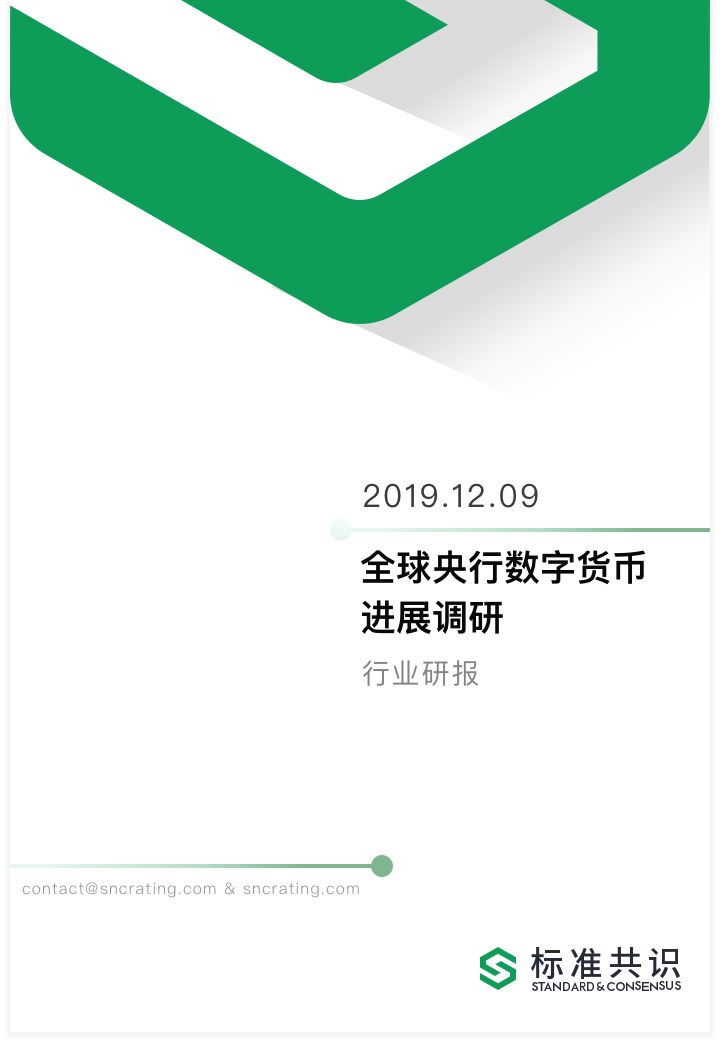Research Report | The latest progress of global central bank digital currencies

Overview
With the change in consumer payment habits, the role of cash is weakening. Cashless transactions will be the next payment frontier. At present, the central banks of many countries are preparing for the issuance of digital currencies. The stability and security of digital currencies is a top priority for central bank R & D.
Report
Several central banks prepare to issue digital currencies
The latest survey report jointly issued by IBM and the International Monetary and Financial Institutions (OMFIF) shows that the first central bank digital currency (CBDC) is expected to be issued within the next five years.
The report shows that central banks in many countries are considering developing and issuing central bank digital currencies (CBDC). Consumer-oriented CBDCs may be launched in the next five years, and consumer-oriented CBDCs may require some form of corporate cooperation. CBDC is a digital asset issued by the central bank for payment and settlement. The central bank's digital currency is expected to be divided into two types: retail and wholesale. The retail type is mainly used by the public and companies. The purpose is to replace the existing fiat currency M0; the wholesale type is used for interbank settlement services, which will effectively improve payment efficiency and reduce the costs and complexity associated with existing payment systems Sex.
- Ukraine officially legalizes cryptocurrency payments and will strictly abide by FATF regulatory rules
- Summary of Special Subsidy Policies for the Blockchain Industry in 10 Cities
- Popular Science | Data Privacy Protection Mechanism + Blockchain Application Scenarios
IBM and OMFIF also concluded from the survey that the first CBDC is expected to emerge from a small economy within the next five years and respond to a specific policy goal with a clear purpose. The survey, which began in July 2019 and lasted three months, involved central bank officials in 13 advanced economies and 10 emerging markets. 73% of those surveyed expressed support for CBDC, thinking that in some cases, CBDC would be a good substitute for cash.
China
China is currently at the forefront of digital currency issuance. According to Caijing, the central bank's statutory digital currency pilot project led by the People's Bank of China, including the four major state-owned commercial banks of Industry, Agriculture, China, and Construction, and China Telecom, China Telecom, and China Unicom is expected to be launched in Shenzhen, Landed in Suzhou and other places.
This is nearly three years away from the first trial of the fiat digital currency. Compared with the previous trial, this pilot of the digital currency of the central bank will step out of the central bank system and enter service scenarios such as transportation, education, and medical treatment, reaching C-end users and entering the frequent application stage , Pilot banks can choose scenes according to their own conditions. The pilot project was led by the Central Bank's Currency, Gold and Silver Bureau, and the Digital Currency Research Institute specifically implemented it. At the end of last year, the anti-counterfeiting department under the Central Bank's Currency Gold and Silver Bureau was changed to the Digital Currency and Anti-Counterfeiting Management Office, as the only official authoritative office of the central bank's digital currency.
In addition, the testing of relevant standards of fiat digital currencies and payment system access are also progressing simultaneously.
United States
In October, a report by the Federal Reserve entitled "Digital Currency, Stablecoin, and Evolving Payment Patterns" mentioned that central bank digital currency can be a flexible form of currency issued by the central bank and may even help solve the US dollar. Triffin's dilemma.
However, according to Bloomberg, Treasury Secretary Steven Mnuchin said in a hearing before the House Financial Services Committee that the Fed has no need to issue digital currencies within five years and does not oppose Facebook's creation of digital currencies. And anti-money laundering provisions, and must not be used to finance terrorism.
At present, the United States still has a wait-and-see attitude towards issuing central bank digital currencies.
Europe
It is reported that if European internal payment costs remain high and private payment systems cannot solve the problem of payment costs, the European Central Bank will launch digital currencies for internal payment settlement, and said that signs of reduced cash use will also accelerate the implementation of digital currencies.
France
According to foreign media, the Governor of the French Bank announced that France will begin testing a central bank digital currency provided to financial institutions in 2020. And said that before the end of the first quarter of 2020, trials and project information will be released. There are also reports that the Bank of France's Payments Supervision and Market Infrastructure Agency will be renamed the Infrastructure, Innovation and Payments Agency. The new agency will be responsible for central bank innovation in digital currencies, payments and infrastructure.
India
Eighteen months after the Reserve Bank of India ordered a ban on banks, e-wallets and payment gateway providers to support cryptocurrency exchanges and other cryptocurrency trading-related businesses, their attitudes seem to be changing. The Indian central bank has planned to develop the central bank's digital currency (CBDC), but has not announced specific implementation plans and timing. Indian Central Bank Governor Shaktikanta Das said that with the development of technology, the Reserve Bank of India will take the central bank's digital currency seriously at the appropriate time, but it is still in its infancy.
Thailand
In May 2019, the Central Bank of Thailand and the Hong Kong Monetary Authority signed a memorandum of understanding and stated that the monetary authorities of Hong Kong and Thailand are preparing to launch a two-tiered digital currency, which is the use of fintech or fintech for the two economies Part of the process of cross-border money transfer to create a prototype.
The first layer of the prototype is called the LionRock-Inathanon project. This will involve the issuance of digital currencies to Hong Kong banks participating in the pilot scheme. A Hong Kong Monetary Authority spokesman said the second tier involves banks distributing digital currency to their corporate customers for wholesale payments with other banks or other companies.
The main purpose of this plan is to study the application of "central bank digital currency" in the cross-border payment field, so as to promote the simultaneous delivery of dual currency foreign exchange transactions between banks in Hong Kong and Thailand. It is expected that the relevant joint report will be Announced in the first quarter of 2020. This "central bank digital currency plan" is a different use case than the digital currency that the People's Bank of China is developing. While the central bank focuses on replacing cash in circulation, the focus of the LionRock project is to simplify cross-border transfers and payments between banks and companies.
Tunisia
Tunisia has announced the launch of a digital version of its national currency, Dinar "E-Dinar". This small North African country has become the first country in the country to issue a central bank digital currency (CBDC). Tunisia has established a partnership with Russian company Universa to issue E-Dinar through Universa's blockchain platform. At the launch, a transfer was made symbolically between Marouane EI Abassi, Governor of the Central Bank of Tunisia, and a representative of the International Monetary Fund (IMF).
Conclusion
Countries around the world have shown interest in central bank digital currencies (CBDC), but no decisive central bank digital currency has yet emerged. With the advancement of technology and the growing role of technology and finance in the overall financial framework, the emergence of central bank digital currencies will have a significant impact on monetary policy and the stability of the financial system. In addition to technical assistance, the issuance of digital currency by the central bank also needs to have a sufficient framework to ensure governance and risk management to ensure its healthy and stable development.
We will continue to update Blocking; if you have any questions or suggestions, please contact us!
Was this article helpful?
93 out of 132 found this helpful
Related articles
- Risk of Compound being overlooked: insufficient liquidity and bank runs
- Industry Blockchain Weekly: Banks Take the Lead, Hainan's Policies Are Most Aggressive
- The bridge for millions of users to enter the world of cryptocurrencies: an article to understand the Ethereum expansion solution ZK Sync
- The demand for cryptocurrencies may skyrocket! What else does Deutsche Bank report "Imagine 2030" imply?
- The "Bitcoin Giant Whale" gray company continues to move in 2019, indicating that there may be great changes in 2020?
- Perspectives | Stateless Clients: New Trends in Ethereum 1.x
- One article to understand why 2019 is the year of DeFi and 2020 is the year of DeFi






